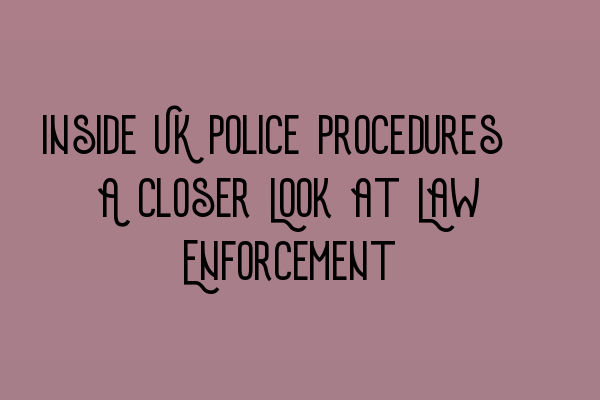Inside UK Police Procedures: A Closer Look at Law Enforcement
Welcome to our blog post on SQE Criminal Law & Practice Law UK, where we delve into the intricacies of UK police procedures. In this article, we will take you through the various stages of law enforcement, highlighting the key aspects of each step. Whether you are a law student preparing for the SQE exams or just curious about how the UK police operate, this article will provide you with valuable insights.
The Investigation Process
Every criminal case starts with an investigation, wherein the police gather evidence to establish the facts of the case. This may involve interviewing witnesses, examining crime scenes, and collecting any relevant physical or digital evidence. Our SQE 1 Practice Exam Questions can help you test your knowledge on the investigative process.
Once the evidence is collected, the police evaluate the information to determine if there is enough evidence to proceed with the case. If they believe a crime has been committed and they have gathered sufficient evidence, they will move on to the next stage – charging the suspect.
The Arrest and Charging Process
When the police decide to charge a suspect, they will arrest them and bring them into custody. This is a crucial stage in the legal process, and it is important that proper procedures are followed to ensure fairness and protect the rights of the accused. Our SQE 1 Practice Mocks FLK1 FLK2 can help you understand the legal aspects of arrests and charging.
During the arrest, the police must inform the suspect of their rights, including the right to remain silent and the right to legal representation. They must also record the arrest accurately and provide the suspect with a written notice of the reasons for their arrest. This notice is known as a custody record, and it is an important document in the legal proceedings.
The Custody Process
Once in custody, the suspect’s rights continue to be protected. The police must ensure that the suspect is treated fairly and that their basic needs are met, such as access to food, water, and medical attention. They must also inform the suspect of their right to have someone informed of their arrest, such as a family member or solicitor.
During the custody period, the police may question the suspect to gather additional evidence. However, they must adhere to strict rules regarding the admissibility of evidence obtained during police interviews. These rules are designed to prevent coercion and ensure that the suspect’s rights are respected.
The Charging Decision
After the investigation and custodial process, the police will review the evidence to make a charging decision. They will consider the strength of the evidence, the public interest, and any relevant legal guidelines. If they decide to charge the suspect, they will prepare a charge sheet that outlines the specific charges against them.
At this stage, it is crucial for the police to ensure that the charges are accurate and supported by the evidence. Mistakes in the charging process can have serious consequences, which is why training and expertise in criminal law are essential for law enforcement officers. Our SQE 2 Preparation Courses can help you gain a comprehensive understanding of the legal principles involved in charging decisions.
Conclusion
Understanding police procedures is essential for anyone involved in the criminal justice system, whether as a lawyer, law student, or legal professional. By familiarizing yourself with the stages of law enforcement, you can better navigate the complexities of criminal cases and provide effective representation to your clients.
If you are preparing for the SQE exams, we recommend checking out our SQE 1 Preparation Courses to enhance your knowledge and boost your chances of success. Stay up to date with the latest SRA SQE Exam Dates to plan your study schedule effectively.
We hope this article has provided you with valuable insights into UK police procedures. For more information and resources on criminal law, keep exploring our blog and website. As always, we are here to support you in your legal journey.
